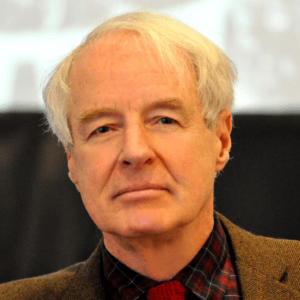The American Historical Association takes great pleasure in presenting its Theodore Roosevelt-Woodrow Wilson Award for Public Service, which recognizes individuals outside the academy who have made a significant contribution to history, to Adam Hochschild, a journalist and writer of history who has produced a body of work with the rare capacity to garner scholarly admiration, capture broad public interest, and to act as a catalyst for significant changes in the historical consciousness of societies both abroad and at home.

Adam Hochschild
Throughout his writings over the last decades, Adam Hochschild has focused on topics of important moral and political urgency, with a special emphasis on social and political injustices and those who confronted and struggled against them, as in the case of Britain’s 18th-century abolitionists in Bury the Chains; The Mirror at Midnight, a study of the struggle between the Boers and Zulus for control over South Africa in the 19th-century Battle of Blood River and its contentious commemoration by rival groups 150 years later; the complex confrontation of Russians with the ghost of Stalinist past in The Unquiet Ghost: Russians Remember Stalin; and the cruelties enacted during the course of Western colonial expansion and domination, notably in his widely acclaimed King Leopold’s Ghost: A Story of Greed, Terror, and Heroism in Central Africa, among his many other publications. All his books combine dramatic narratives and meticulous research, at once paying tribute to his subjects in the past and exhorting contemporaries to confront the truth and repudiate complaisance, credulousness, and complicity through silence.
To take only one example, in King Leopold’s Ghost, Hochschild broke through one of the most impenetrable silences of history: the story of the murderous “red rubber” regime of Leopold’s Congo free state, later the Belgian Congo, whose ruthless colonial exploitation, mass death, and rampant atrocities in the Congo had long been suppressed. To uncover the story of what happened in the Congo, Hochschild immersed himself in abundant materials from the period, marshalling extensive evidence to chronicle the systematic and unprecedented brutality of Leopold’s regime, the insatiable voracity that infected those who benefitted from the Congo’s colonial exploitation and the king’s formidable capacity to resist an army of critics. King Leopold’s Ghost had an extraordinary impact, attracting readers the world over, altering the teaching and writing of history and affecting politics and culture at national and international levels. Published in English and translated into 11 additional languages, the book has been incorporated into secondary school curricula and appears as a key text in the historiography of colonial Africa for college and graduate students.
But it is within Belgium that Hochschild’s work has had the most dramatic impact, demonstration the active and transformative power of history. The publication of King Leopold’s Ghost forced Belgians to come to terms for the first time with their long buried colonial past and generated intense public debate that so troubled Belgian officials that they reportedly instructed diplomats on how to deflect embarrassing questions that the book raised about the past. The book offered welcome support for others in Belgium who sought acknowledgment and accountability for Belgian actions in the Congo, leading the government, in 2001, finally to apologize for its role in the assassination of Patrice Lumumba, which Debora Silverman, an American historian of these events, believes would not have occurred without the international spotlight caused by Hochschild’s work. Moreover, she argues, King Leopold’s Ghost was largely responsible for the announcement in 2005 that the central monument of the “great forgetting,”—King Leopold’s palatial Congo Museum at Turvuren—would renovate and significantly change its displays and collections.
Few works of history have the power to effect such significant change in people’s understanding of their past. It is, therefore, particularly fitting that Adam Hochschild should receive an award in the name of Theodore Roosevelt and Woodrow Wilson (both presidents, in fact, appear in King Leopold’s Ghost). In recommending him for this award, the AHA affirms the importance of the historians’ practice and the significance of its humanist agenda in promoting both an understanding of the human capacity for cruelty, brutality, and violence together and the capacity to act upon that understanding through courageous acts of opposition and a willingness to defy the silences imposed by history in order to combat inhumanity. It is, therefore, with great pleasure that the AHA joins to Hochschild’s numerous other awards that of the Theodore Roosevelt and Woodrow Wilson Award for significant contributions to history.